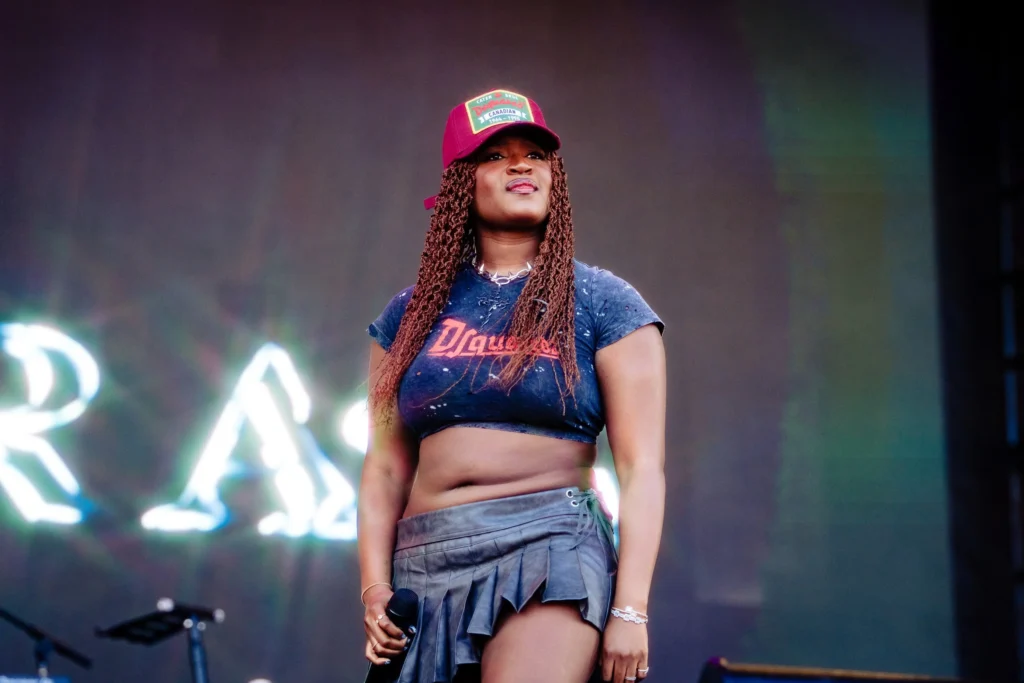A small controversy has been brewing on social media over the release of the singer Amaarae’s new album “Black Star“.
Named after the iconic symbol on Ghana’s flag, the album has so far been well received, scoring high scores from well-known outlets including Pitchfork.
Released on August 8th, Black Star‘s tracklist, which features popular names including PinkPantheress, Naomi Campbell, and Charlie Wilson, has been getting some pushback from a small section of Ghanaians online.
Some insinuated that the album, which was heavily promoted as an ode to Ghana, does not feature “Ghanaian” sounds or local artists.
Most pointed to Amaarae’s 2025 Coachella performance, where she paid homage to Ghanaian acts like La Meme Gang, Eazzy, and the Asaaka Boys, setting expectations for a deeply local sound.
On stage, Amaare featured a mashup with the popular Ghanaian song “Deeba”, which set up expectations for similar sounds for the album.
Instead, fans say that most songs (like “Stuck Up” and “S.M.O.” which lean heavily into Brazilian funk and Detroit techno) only offer subtle nods to Ghanaian sounds in their production.
Amaarae mashing up Ghanaian legend Deeba's old classic at Coachella #Coachella2025 #RevolvePlus #amaarae pic.twitter.com/NeO0X7xOZ2
— RevolvePlus (@RevolvePlus) April 14, 2025
Amaarae’s Defense on Social Media
The online discourse caught the attention of the singer, who defended herself from critics of the sound of the album.
In an X thread posted on August 15, she argued that “Black Star is definitely about my GH identity & GH music through my lens.”
She pointed to specific tracks like “100DRUM” which weaves Ghanaian gospel with kpanlogo rhythms and stated that songs like “FREE THE YOUTH”, channel Hiplife and Azonto with trap synths.
She further stated that her recent trip to Brazil to study their innovative drum patterns informed her approach to reimagining Ghanaian sounds for a global audience.
“I went to BRAZIL to record before I came to Ghana because BRAZILIANS have very few drum patterns, but for the past decade +, they have been able to continuously innovate,” she wrote.

The Native, an African-based online outlet, echoed Amaarae’s sentiments in their early impressions of the album, calling it “another evolutionary arc” for the singer.
One reviewer noted that although they expected to see Amaarae lean more heavily on her Ghanaian heritage, the title and cover of the album were enough.
“Maybe Amaarae just wants us to dance, and that’s what I’m just gonna do, and you should too“, they said.
“Generally, I feel like the Ghanaian audience is not very receptive to new ideas”
A Ghanaian music fan
Were Ghanaian Fans Expecting Too Much?
Amaarae, who splits her time between Accra, Los Angeles, and beyond, has always been an outlier when it comes to her music.
Her 2023 album, Fountain Baby, blended Afropop with cyberpunk aesthetics, earning critical acclaim, with the song “Angels in Tibet“, shooting her to international stardom.
Black Star continues this trajectory, with its “noirish, nocturnal” vibe and lyrics exploring desire and digital excess.

Some music fans said the local reaction to her new album is overblown. One noted that Amaarae had done a good job promoting Ghana in almost all her interviews, even if she didn’t feature local acts in “Blackstar“.
“She doesn’t have to make highlife or Afrobeats or feature our local champions to project Ghana and our culture,” the fan said.
Another fan said Ghanaians might have been expecting too much, saying Amaarae never stated she would feature Ghanaian acts in her album.
He also criticised Ghana’s music fans when it comes to embracing “new” sounds.
“Generally, I feel like the Ghanaian audience is not very receptive to new ideas,” he said.
Whether Ghanaian fans will embrace Amaarae’s vision remains to be seen, but her album Black Star is undeniably a milestone.
It has earned rave reviews from most online outlets like GRAMMY.com and NME, cementing Amaarae’s status as a pop innovator.
Whether her sound is “Ghanaian” enough might be put on the back burner if it earns her a national award nomination like a Grammy.
Local music fans who disagree with the new album might have to make peace with the singer’s trajectory and the marketing of her Ghanaian background.
As Amaarae once said in an interview: “I want to put myself in a position where my music is recognisable and respected.“
Maybe it might be time to rethink how “Ghanaian” music sounds in the future and on the world stage.
“Black Star” is out now on streaming platforms.


